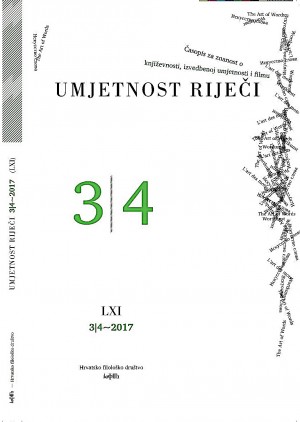“The Naked Person” and “The Unbearable World”: Variations of Exodus (Based on Early Prose by A. I. Solzhenitsyn)
“The Naked Person” and “The Unbearable World”: Variations of Exodus (Based on Early Prose by A. I. Solzhenitsyn)
Author(s): Natalia Kovtun, Natalya KlimovichSubject(s): Cultural history, Sociology of Culture, Philology, Ontology, Identity of Collectives
Published by: Hrvatsko filološko društvo
Keywords: A. Solzhenitsyn; “naked person”; “labour camp prose”; One Day in the Life of Ivan Denisovich; The Cancer Ward;
Summary/Abstract: This paper analyses the motif of “the naked person” in Alexander Solzhenitsyn’s early work. Epic tales which belong to the so called “labour camp prose”, such as One Day in the Life of Ivan Denisovich (1959) and The Cancer Ward (1968), stand out in the context of this motif. Moreover, the “unbearable world” and the “naked person” have been structurally significant for the “labour camp prose” since Fyodor Dostoevsky and Anton Chekhov. All of them imply that these elements bring the reader closer to understanding the ontology of a person who is forbidden to wear a cross on his chest and thus seek protection from God and cultural myths. The paper examines historical developments of the “naked person” imagery in Russian literature from the seventeenth century to the Avantgarde and postmodernism by analysing relations between reality and the “unbearable world” (the space of labour camps) in which nakedness and misery are deemed to be charisma, gifts from God. The Cancer Ward is still one of Solzhenitsyn’s most widely read works in Europe and America. Unlike the peasants in the story, Kostoglotov, an intellectual, reflects on the value of freedom, prospects of choice and the nature of evil – something which Ivan Denisovich touches upon only vaguely. The author is interested in mechanisms of self-identity in horrendous living conditions. Solzhenitsyn’s The Cancer Ward is a variation of the classic “non-finito” narrative. The protagonist, who has endured hardship and overcome limits of the “unbearable world”, moves towards the house ark as his life is just beginning. In fact, by employing terrible history, a labour camp and the hospital ward of the doomed, Solzhenitsyn’s text explores the driving forces behind a person’s self-identity, the most important of which are moral elevation, will, mercy and belief in life.
Journal: Umjetnost riječi
- Issue Year: 2021
- Issue No: 3-4
- Page Range: 181-205
- Page Count: 25
- Language: English

